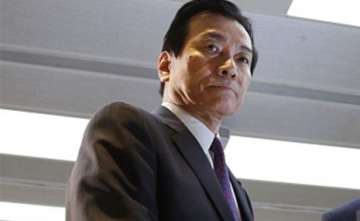Chairman of Japanese conglomerate Toshiba Corp., the organization that has seen a tumultuous past few years, resigned Tuesday after the company logged such massive losses in its nuclear business that it must sell its lucrative computer-chip business to avoid going bankrupt.
The company projected a 712.5 billion yen (Rs 43,000 cr) loss for its nuclear business related to the acquisition of CB&I Stone & Webster by its US nuclear unit Westinghouse. The company also said it will not take on new projects to construct nuclear plants.
President Satoshi Tsunakawa said the company also was looking for potential partners to acquire a stake in Westinghouse.
He bowed deeply at a news conference to apologize for "troubling investors and stakeholders".
Earlier Tuesday, Toshiba delayed reporting its official financial results by a month, citing auditing problems. That sent Toshiba stock tumbling 8 percent in Tokyo trading.
After the market closed, it released unaudited numbers, warning they may change "by a wide margin."
The company said Shigenori Shiga, the chairman, will step down from the board, effective Wednesday, but stay on as a Toshiba executive.
Toshiba said its net worth was in the negative, at minus191 billion yen (USD 1.7 billion) by the end of last year. The company hopes to fix that by the end of March by selling its flash-memory business and other assets.
In a stunning acknowledgement, Tsunakawa told reporters the company viewed its move into the nuclear sector by acquiring Westinghouse in 2006 as a misstep that led to its present woes.
Westinghouse's purchase in 2015 of CB&I Stone & Webster, a nuclear construction and services business, was aimed at winning more business in decontamination, decommissioning and plant projects. But it just amplified that problem.
Auditors questioned Toshiba's latest reporting on the acquisition of CB&I Stone & Webster after a whistleblower, an employee at Westinghouse, wrote a letter to the Westinghouse president.
The company said it will reorganize its nuclear business to be directly under Tsunakawa for stricter monitoring.
It will also focus on reactor maintenance, the nuclear fuel business and decommissioning of the Fukushima nuclear plant in Japan, where reactors went into multiple meltdowns after the March 2011 earthquake and tsunami.
(With AP inputs)
Latest Business News
